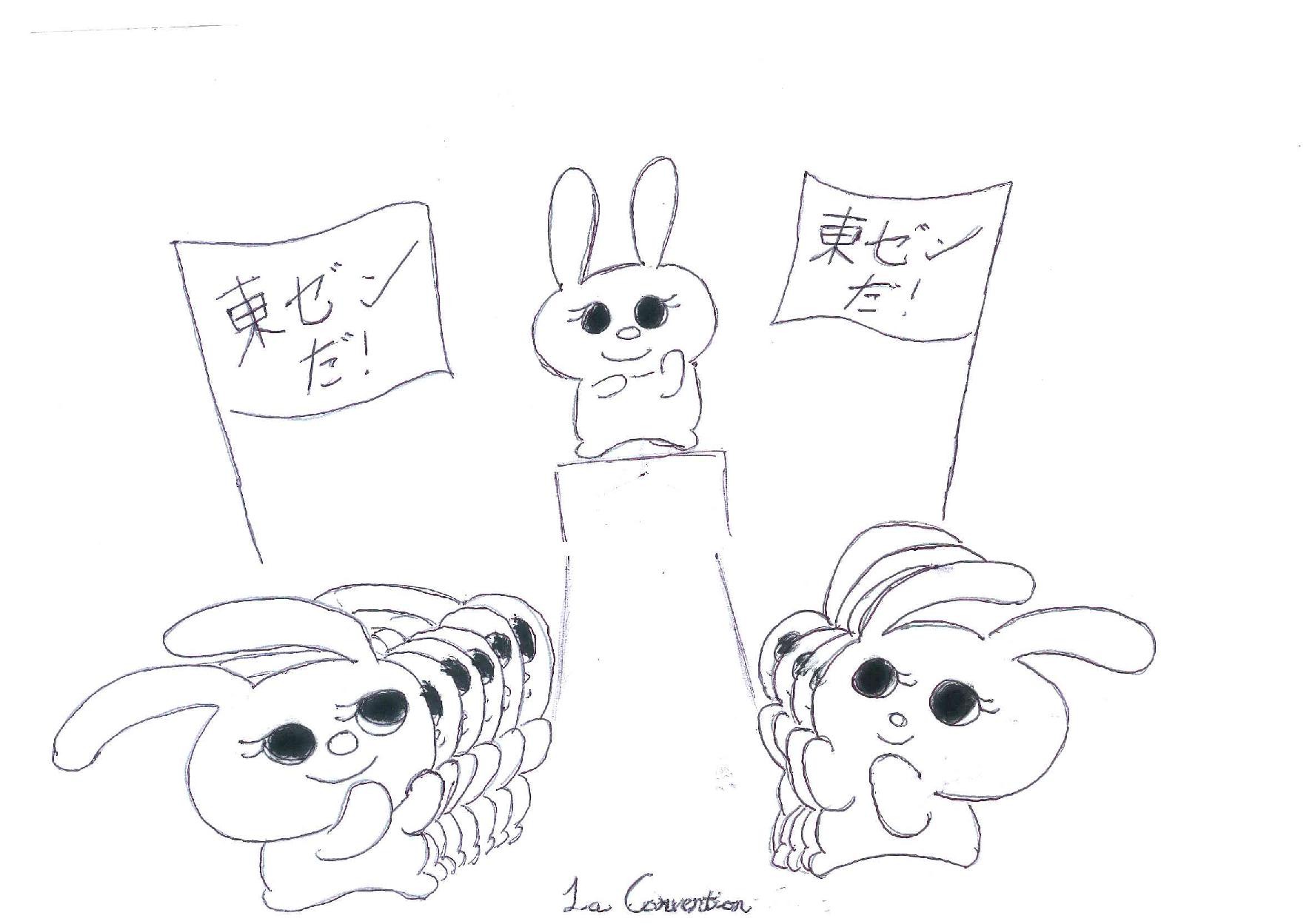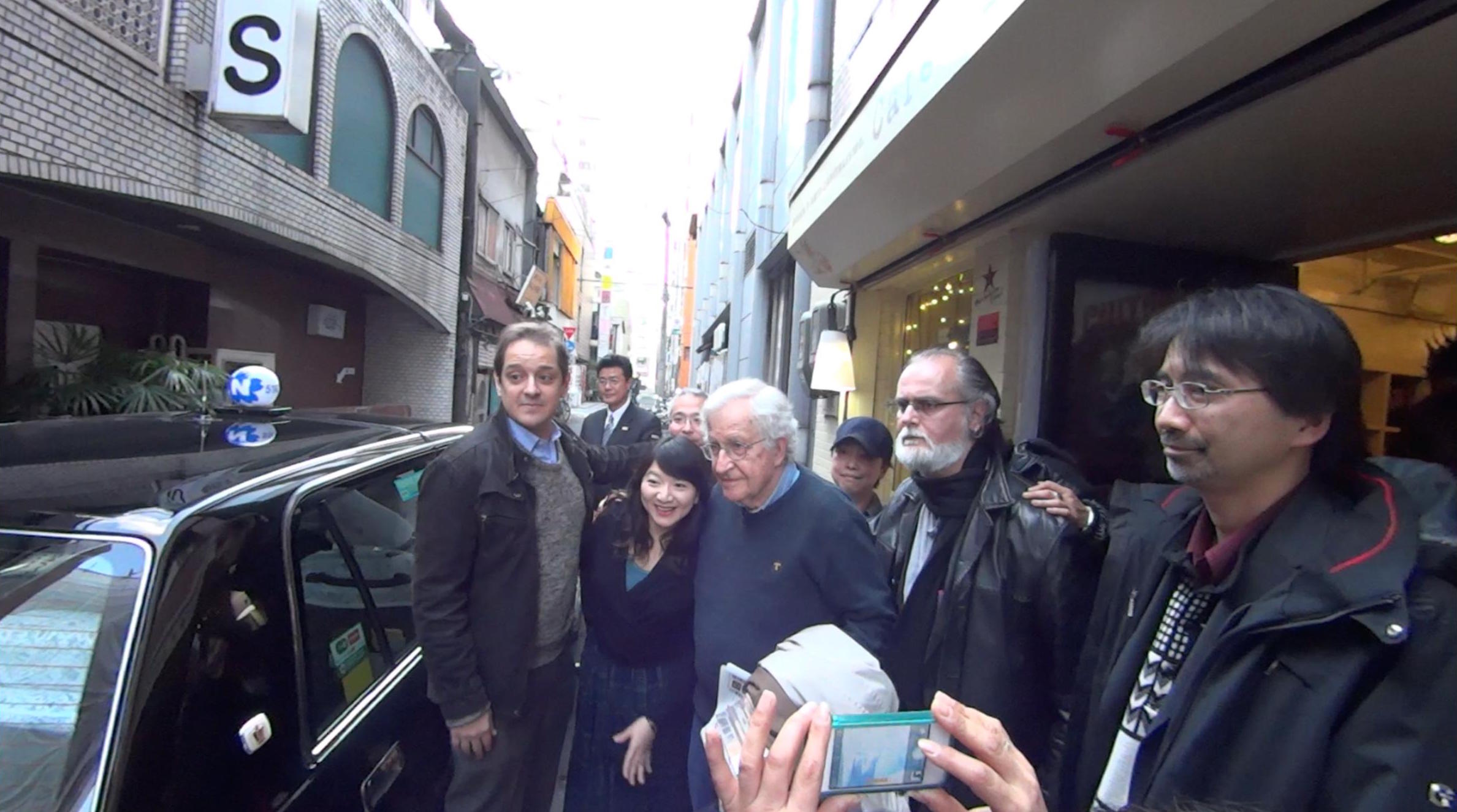Events
Michael Albert Weighs In On Tozen Chomsky Chat
ZCommunications founder and staff member Michael Albert weighs in on our chat with Noam Chomsky.
Follow the link and read his thoughts on the subject of Participatory Economics.
Tozen Report: All Day Dispute Action Against GABA
Last Friday, Tozen GABA Workers Union took its first all day action against GABA’s threat to fire Tozen GABA Workers Union President Tyler Christensen.
We began at 6AM to leaflet GABA Shinagawa Learning Studio. We moved on to Gaba corporate HQ at 9AM. There as we handed out leaflets, GABA representative Satomi Odaka emerged from the building.
The union handed Mr. Odaka a notification of dispute, outlining the specific demands of our dispute. You can read about them here. Mr. Odaka responded by asking for our “road use permit,” which we don’t need, physically obstructing Case Officer Gerome Rothman and threatening to call the police.
GABA then took the step of calling the police in an attempt to shut down our protest. We explained to the police that we were conducting legitimate union activity. The police decided not to interfere.
We did a loud protest call with the megaphone, and concluded our action. After that, we filed a protest with the company demanding an apology for their obstruction of legitimate union activity. We demanded they follow the law and desist from interference with union activity.
Tozen went to Yokohama Learning Studio, where Tyler works. During leafleting, Tyler spoke directly to his colleagues, sharing his story and drawing their support. He also took to the megaphone in an appeal to GABA management, asking them to “Let me do my job.”
GABA members and Tozen supporters wrapped up their protest at the end of the GABA work day, in Chiba. We leafleted at the Chiba Learning Studio.
Our first protest against GABA spanned 2 prefectures and the Tokyo Metropolis, 3 Learning Studios, and GABA HQ. We confronted a hostile management, and meaningfully engaged with sympathetic members of the GABA community.
We would love to think that a marathon fourteen hours of protesting GABA’s stubbornness will mean the end of our struggle for Tyler. We know, however, this is just the very beginning.
We need your help.
Tozen will not back down when its members are threatened with unfair discipline and attacks on their rights as workers. Tozen knows that all workers in Japan have the right to join a union, negotiate with management, and take collective action to improve their working conditions.
Join our fight. Let’s make GABA better for everybody.
Chomsky Tells Tozen that Systems of Power Don’t Say Thank Youノーム・チョムスキーから東ゼンへ:「権力者は、反対する者にはお礼を言わない」
)
Tozen Activists Chat with Activist Noam Chomsky
ノーム・チョムスキーは来日中、東ゼン労組の活動家と話し合いを
Leaders and members of Zenkoku Ippan Tokyo General Union (“Tozen Union”) met Saturday afternoon (March 8, 2014) with Professor Noam Chomsky at Café Lavandería in Shinjuku, Tokyo, at an event hosted by Tokyo Spring.
2014年3月8日、
The activist and linguist expressed great interest in the activities of both Tozen Union and Tokyo Spring. “I’d like to know what you guys are doing,” Chomsky said.
チョムスキー教授は東ゼン労組と東京スプリングの活動に関して深
Several members of both organizations asked questions and related their experiences in activism and organizing.
集まれた活動家はチョムスキー教授に質問をしたり、
Tozen member Matthew Allen discussed the dangers of union leaders becoming a “coordinator class” with unwarranted power. Chomsky suggested that efforts to eliminate all division of labor have failed.
東ゼン労組のマシュー・
Sulejman Brkic, Tokyo Spring activist and member of Tozen Union, MCed the event, while Tozen Union General Secretary Louis Carlet interpreted between Japanese and English. Tozen President Hifumi Okunuki presented Chomsky with a calligraphy-written haiku (see below). Brkic gave him the black and red flag of anarcho-communism on behalf of Tokyo Spring.
東京スプリングの活動家および東ゼン労組の組合員を兼ねるスレ
Chomsky encouraged Tozen and Tokyo Spring activists to continue their efforts and said “Anything that you are achieving that undermines and threatens systems of power will meet with oppression. Systems of power don’t say ‘thank you.’ What’s important is not to focus all your efforts on the oppression, but to continue the constructive work.”
チョムスキー教授は東ゼン労組と東京スプリングの活動を励ました
Gaba ‘contractor’ status under fire from staff, courts
Yet after stepping off the tarmac at Narita in August this year, William’s new life in Japan began to turn into something of a nightmare, and the source of the trouble was his new job working for Gaba as an English teacher.
According to William, his troubles began back home in the States when he was interviewed for a teaching position at Gaba by webcam.
“They told me I would be legally required to teach 160 lessons per month for visa sponsorship at a rate of ¥1,500 per lesson. But that didn’t happen.”
William says that rather than the 40 lessons he was promised, he averaged only around 25 — 30 on a good week, and sometimes as low as 10. “This was a source of conflict between myself and my management,” he says.
Despite the fact he was teaching what amounted to a part-time schedule, he had to be in the workplace 40 hours a week or more.
“I would be sitting around in a booth — they would call it a booth, but I would call it essentially a prison cell — and you are expected to sit there until something falls off the cart,” he says.
Gaba teachers are only paid for lessons taught, so the additional time William spent at the studio waiting for lessons was unpaid, yet the company, he says, expected him to be there at all times.
“Once I was verbally disciplined for going out to get lunch. I was verbally warned by my supervisor. . . . He said, ‘You need to be preparing your lesson notes and you need to look to the client like you are doing work and not going out and getting lunch. ‘ And I said, ‘OK, but on the other hand, I am a human being and I need to eat, and I am not being paid for this time so you don’t have the right to tell me that.’ “
Gaba is the only large eikaiwa chain in Japan that doesn’t pay travel costs to teachers commuting to training or work, so attending training would not only have cut into William’s teaching hours, it would actually have cost him money.
William refused to do any further training, and this put him at odds with his supervisors at Gaba, a situation that was exacerbated when he took two days off work.
“I had to go to the hospital because I literally couldn’t talk and found out I had a throat infection,” explains William. “They made me meet with the regional manager and told me not to miss any more days. They told me they were going to reduce my schedule as punishment.”
As an overseas recruit, Gaba was also the sponsor of William’s working visa, which made him feel particularly insecure.
“I felt very depressed, anxious, uncertain about what I was going to do. I was afraid I would have to go home. At this time I wasn’t making enough money monthly to pay anything more than pay my rent — I was losing money,” he recalls. “One day I went in for 8½ hours and I actually lost money going to work because none of my lessons booked. I figured out later on that this had something to do with the fact they had deleted my schedule from the client view of the instructors on their website.”
A complaint sometimes leveled by former Gaba instructors is that their learning studio manager or supervisor reduced their teaching schedule, and thus income, in order to discipline or control them.
In the Gaba employment contract that all teachers working in nonmanagerial roles sign, it states that “All instructors at Gaba teach under an Itaku, or entrusted, contract. The terms of this kind of system are different from employment. Entrusted instructors are essentially independent contractors that have been contracted to provide an established service, namely English instruction.”
In addition, many teachers also sign an “Entrusted Contract Awareness” document, which says: “Itaku contractors are not committed to fixed working hours as salaried employees are. We do not assign set work schedules but rely on instructors to inform us when they are available. Although we offer flexible scheduling, our peak times of operation are early weekday mornings, weekday evenings and all days weekends.”
Despite the fact that official company policy states they offer “flexible scheduling,” stories such as Herve’s and William’s suggest that, at least in some cases, pressure is put on instructors to choose shifts that fit the needs of the company alone.
Gaba teachers have even less freedom, despite their status as itaku contractors, with regards to dress.
Gaba was recently purchased by Japanese medical services company Nichii Gakkan for ¥10 billion. Earlier this month Canadian Bruce Anderson replaced Kenji Kamiyama as CEO of Gaba.
Shifting demands led to collapse of Geos
Behind the bankruptcy of Geos Corp., a major operator of English-language schools, are two words whose value can be recognized in any language: time and money.
Japanese studying English are increasingly using free Internet-based programs and steering clear of the high fees and rigid scheduling of traditional language schools.
“With an abundance of choices today, things are different from the days when learning English meant attending an English-language school,” said Masato Honma, who penned the book “Eigo wa Netto Doga de Minitsukero!” (Pick up English through video on the Net).
The shift in attitude among Japanese consumers was prompted by the October 2007 collapse of Nova Corp., once the largest language school operator in Japan.
The number of students attending foreign-language schools dropped from about 827,000 in February 2006 to around 336,000 this February, according to industry ministry statistics.
The decline was particularly sharp after Nova’s failure, which exposed problems concerning unpaid wages to teachers, suspected fraud and the difficulties getting refunds for canceled contracts.
Geos’ customers could feel the same sting after the company filed for bankruptcy protection Wednesday.
“I am shocked to the point where I cannot find the words,” said a 47-year-old woman from Hasuda, Saitama Prefecture, who had just paid one year’s worth of fees for her twins.
While Geos tries to deal with its nearly 37,000 students and 335 schools, Smart.fm, a website offering English-language lessons for free, continues to gain in popularity.
More than 1 million users are registered with Smart.fm, which was set up in October 2007 and offers more than 100 programs ranging from basic skills to advanced courses.
The majority of students today at language schools are workers who need English skills for their jobs and people planning to take the Test of English for International Communication (TOEIC) to improve their job prospects amid the economic downturn.
Jun Nakagawa, a spokesman for Berlitz Japan Inc., noted that many companies have reduced their employee training budgets particularly since the collapse of Lehman Brothers triggered the global financial crisis.
Now, businesspeople with no time to attend classes at schools make up a large portion of Smart.fm’s students.
Nakagawa also said free services may have taken away many would-be students looking to study English to enhance their image or kill time.
“The group who learned English because ‘it would be cool if I could speak English’ has disappeared from many schools,” the official said.
The trend will likely affect the hordes of native-English speakers who came to Japan for teaching jobs.
“The age when language schools could boast an abundance of native speaking instructors has ended,” said Yukio Otsu, a professor at the Institute of Cultural and Linguistic Studies at Keio University. “Some added value such as (teaching) ways of thinking, will be required.”
Foreigners rally over job security
Hundreds of foreign and Japanese people staged a rally Sunday in Tokyo demanding better working conditions and employment benefits for foreign residents.
At the annual “March in March” event at Hibiya Park in Chiyoda Ward, Louis Carlet, deputy general secretary of the National Union of General Workers Tokyo Nambu, said foreign workers have a great need for job security and health care.
“It’s difficult to be a foreigner in any country. But it’s much more difficult when you don’t have job security, when you don’t have health care,” said Carlet, whose union jointly hosted the event with other groups lobbying for improved labor conditions.
One of the biggest problems is that most foreigners are being employed as nonregular workers, and more and more Japanese are being used the same way, he said.
Participants at the rally included people from many different ethnic backgrounds as well as various unions. Organizers said around 400 people took part.
Romsun Pramudito from Indonesia, who chairs the Tokyo-based nonprofit organization Indonesia Youth Association, said more job security should be given to foreigner workers.
“We are working very hard and really contributing to the country,” he said, adding he hopes foreigners receive better treatment. He also said foreigners and Japanese should collaborate to find a solution.
Buddhika Weerasinghe, a Fukui-based freelance photojournalist from Sri Lanka, came to the event because he is interested in the problems foreign workers face in Japan.
Weerasinghe said he has heard from foreign workers in the city of Fukui — many of them Chinese working in garment factories — that some received salary cuts without explanation and even experienced physical harassment. “I feel foreigners working in Japan are facing a lot of problems.”
While hopeful that improvement will accompany the change in government last September, little progress has been made, Carlet said.
“We want the new government to take this issue very seriously and make serious change,” he said.
The event also featured a live music by musicians from various countries, including Senegalese drum sessions and Ainu dancing from Hokkaido.
A march planned after the gathering, however, was called off because of the chilly rain, organizers said.
Nambu New Year Flag Raising Party
Tokyo Nambu’s New Year Flag Raising Party will be held on Wednesday, January 14 at 7:00pm in Kyurian, across the street from Oimachi Station (JR Keihin Tohoku Line/ Tokyu Toyoko Line). 3,000 yen charge gets you plenty of food, drink and inspiring speeches.
All members and supporters are welcome.
Kyurian
Oimachi 5-18-1, Shinagawa-ku
Google Maps link







